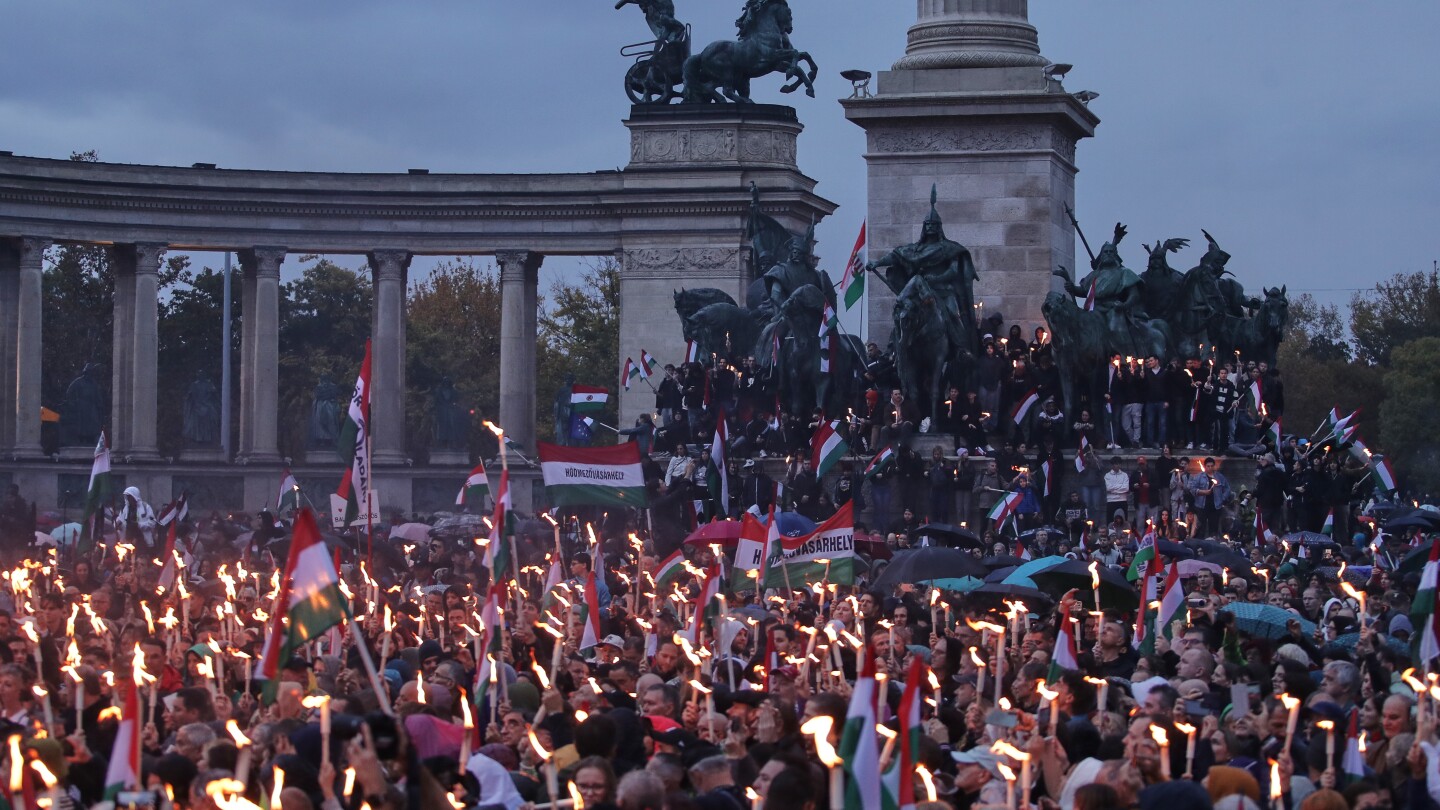
Hundreds of thousands of Hungarians attend rival rallies in Budapest
BUDAPEST, Hungary (AP) — Hundreds of thousands of Hungarians filled the streets of Budapest on Thursday in competing demonstrations as supporters of the country’s two main political movements staged mutual shows of strength before next spring’s national election.
The rival rallies were a standoff between nationalist Prime Minister Viktor Orbán and his main political challenger, Péter Magyar, who looks set to present the long-serving Hungarian leader with the most competitive ballot in his 15 years in power.
The election is due in April, but an exact date for the vote hasn’t been set.
Orbán’s supporters gathered on a bridge spanning the Danube River on Thursday morning and began marching toward Hungary’s towering neo-Gothic parliament. The rally, dubbed a “peace march” by organizers, came on Hungary’s Oct. 23 national holiday, a remembrance of a failed anti-Soviet uprising in 1956 that was crushed by the Red Army.
Participants shouted slogans backing Orbán, and his message that foreign powers threaten to push Hungary into direct involvement in Russia’s war in Ukraine. At the front of the march, one large banner read: “We don’t want to die for Ukraine.”
Addressing the crowd in a speech riddled with hostility for both Ukraine and the European Union — regular subjects of his ire — Orbán accused Kyiv’s European backers of having brought the EU into the war, and of being willing “to send others to die.”
Orbán, considered Russian President Vladimir Putin’s closest partner in the EU, has consistently argued against Western support for neighboring Ukraine since Moscow launched its full-scale invasion on Feb. 24, 2022, and has maintained warm relations with the Kremlin while taking a combative posture toward Kyiv.
The Hungarian leader also has vehemently opposed Ukraine’s ambitions to join the 27-nation EU and has argued for an immediate ceasefire in the conflict, though he hasn’t addressed what that might imply for Ukraine’s territorial integrity or European security amid continuing Russian aggression.
During his roughly 40-minute speech, Orbán said that Ukraine “has long ceased to be sovereign, independent and is absolutely not self-sufficient.”
He said he would support a strategic partnership between the EU and Kyiv, but that Ukraine “cannot be members either of our military or economic alliance. They would bring war, take our money and ruin our economy.”
Later in the day, throngs of supporters of opposition leader Magyar filled one of Budapest’s central squares and adjacent avenues for their own demonstration — both an anti-government protest and a show of support for Magyar and his center-right Tisza party.
Marchers shouted anti-government slogans, as well as “Russians go home!” — a refrain from Hungary’s 1956 anti-Soviet rebellion and a modern reference to many people’s view that Orbán has drawn the country too close to Moscow.
One Tisza supporter, Zsanett Kiss, traveled from Pápa in western Hungary to attend the march. She said she believed Magyar would be able to improve Hungary’s stagnate economy, but also to bring the country back to a more democratic path.
“I want there to be a change already in this country, and I can say that I’ve had enough, enough of the last 15 years,” she said.
Magyar, a 44-year-old lawyer and former insider within Orbán’s Fidesz party, burst into political prominence last year, and has focused his message on bread-and-butter issues affecting the majority of Hungarians: persistent inflation, poor health care and increasingly salient allegations of government corruption — all sources of dissatisfaction that have plagued Orbán’s government.
Magyar has focused his campaign on the rural countryside, traditionally a reliable voting bloc for Fidesz. He recently ended an 80-day tour of the country where he held scores of town hall-style forums, giving speeches and taking questions from attendees.
Speaking to the crowd of his supporters that filled Budapest’s sprawling Heroes’ Square, Magyar accused Orbán of impoverishing the country by misusing public funds, and of turning Hungarians against one another.
However, he also struck an inclusionary tone, encouraging his supporters to embrace their political opponents following next April’s election.
“I call on everyone to stick together and endure these six bitter months, and then to reach out to those who gathered at another event today,” Magyar said. He encouraged the crowd to imagine a future in which, “on October 23 of next year, there are not two contemptuous crowds facing each other, but a nation united, celebrating and smiling at each other.”
The dueling marches on Thursday were seen as a barometer of which politician had more energy behind his campaign as the election nears. Orbán is lagging in the polls behind Magyar’s Tisza, and with six months before the ballot, the prime minister has struggled to reinvigorate his base.
Still, the EU’s longest-serving leader remains popular among a sizable portion of Hungary’s voters, and on Thursday was able to successfully mobilize many thousands to Budapest in his support.
Scores of buses that were used to transport participants from around Hungary and neighboring countries were parked near the pro-government march route. One marcher, Sándor Kerekes, said that he had come to the event from the ethnic Hungarian-majority town of Fantanele, in Romania’s Transylvania region.
“It’s important for us to feel like we can meet with like-minded people, that we think the same things and think with unity,” he said.
First Appeared on
Source link






